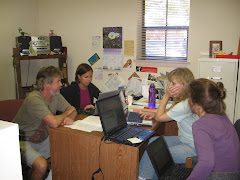Gardner Campbell is the director of the
While planning still has its place, he reports that there are many moments when “tables rise and wonders appear” and there is really nothing to the plan except to give oneself to the conversation. One result of maintaining one’s faith in the conversation (even when the exchange seems to be little more than “mere banter”) is the way that “stubborn blocks” to inspiration are suddenly dissolved. Another summary statement: “fellowship in conversation grants insight.”
My current teaching assignment (fall, 2009) consists of three classes: two sections of the Language Teaching Practicum, one of Introduction to Classroom Observation (ICO). Although students in the former are towards the end of their M.A. experience and the ICO participants are in their first semester, the two have a significant commonality: the learning in both cases is driven by what takes place outside our class. In the Practicum, the students are or have recently been teaching in a second or foreign language programme: our work together in class is focused on helping them make sense of those experiences so that their professional development is facilitated as fully as possible. In ICO, the students observe language classes and come together to generate insights about learning and teaching. Which means that in both cases, my lesson plan consists entirely of how this week we shall be giving ourselves to the conversation.
Specifically, I feel that a key task is the fostering of the “fellowship,” which, “in conversation grants insight.” Which, in turn, links to central interests like community building and Learning Circles, which we shall be reading about in both classes as foundational pieces; and, once again, to the crucial role of co-operative learning and the need to move as rapidly as possible from community building to class building to team building. This reduces the necessary pedagogic repertoire to a very limited menu of tasks and tools: the ability to create heterogeneous groups, a small range of interactive group activities (Think-Pair-Share, RoundTable, and so on), a handful of warm-up exercises, the Zero Noise Signal, my shiny new kitchen timer from Walgreens, large paper and markers, and enticing snacks.
And a commitment to the conversation.






No comments:
Post a Comment